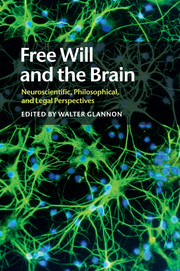Book contents
- Free Will and the Brain
- Free Will and the Brain
- Copyright page
- Contents
- Preface
- Contributors
- Part I Introduction
- 1 Free will in light of neuroscience
- Part II Conceptual issues
- Part III Mental capacities and disorders of the will
- Part IV Neural circuitry and modification of the will
- Part V Legal implications of neuroscience
- Index
- References
1 - Free will in light of neuroscience
from Part I - Introduction
Published online by Cambridge University Press: 05 October 2015
- Free Will and the Brain
- Free Will and the Brain
- Copyright page
- Contents
- Preface
- Contributors
- Part I Introduction
- 1 Free will in light of neuroscience
- Part II Conceptual issues
- Part III Mental capacities and disorders of the will
- Part IV Neural circuitry and modification of the will
- Part V Legal implications of neuroscience
- Index
- References
- Type
- Chapter
- Information
- Free Will and the BrainNeuroscientific, Philosophical, and Legal Perspectives, pp. 3 - 24Publisher: Cambridge University PressPrint publication year: 2015

